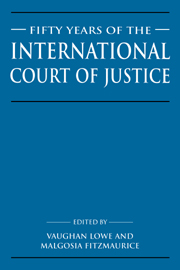Book contents
- Frontmatter
- Contents
- List of contributors
- Preface
- List of abbreviations
- Sir Robert Yewdall Jennings, by Vaughan Lowe
- List of publications of Sir Robert Jennings
- Table of cases
- Part I The International Court of Justice
- Part II The sources and evidences of international law
- Part III Substance of international law
- 10 The Court's role in relation to international organizations
- 11 Cases of the International Court of Justice relating to employment in international organizations
- 12 Jurisdiction and immunities
- 13 Adjudication as a mode of acquisition of territory?
- 14 Equitable maritime boundary delimitation
- 15 Environmental protection and the International Court of Justice
- 16 The contribution of the International Court of Justice to air law
- 17 The treatment of human rights and of aliens in the International Court of Justice
- 18 The International Court of Justice and the right of peoples to self-determination
- 19 The International Court of Justice and the peaceful settlement of disputes
- 20 The International Court of Justice and the use of force
- Part IV Procedural aspects of the work of the International Court of Justice
- Part V The International Court of Justice and the United Nations
- Index
14 - Equitable maritime boundary delimitation
As exemplified in the work of the World Court during the Presidency of Sir Robert Yewdall Jennings
Published online by Cambridge University Press: 02 November 2009
- Frontmatter
- Contents
- List of contributors
- Preface
- List of abbreviations
- Sir Robert Yewdall Jennings, by Vaughan Lowe
- List of publications of Sir Robert Jennings
- Table of cases
- Part I The International Court of Justice
- Part II The sources and evidences of international law
- Part III Substance of international law
- 10 The Court's role in relation to international organizations
- 11 Cases of the International Court of Justice relating to employment in international organizations
- 12 Jurisdiction and immunities
- 13 Adjudication as a mode of acquisition of territory?
- 14 Equitable maritime boundary delimitation
- 15 Environmental protection and the International Court of Justice
- 16 The contribution of the International Court of Justice to air law
- 17 The treatment of human rights and of aliens in the International Court of Justice
- 18 The International Court of Justice and the right of peoples to self-determination
- 19 The International Court of Justice and the peaceful settlement of disputes
- 20 The International Court of Justice and the use of force
- Part IV Procedural aspects of the work of the International Court of Justice
- Part V The International Court of Justice and the United Nations
- Index
Summary
International law can never be a panacea, for law is only one aspect of the immensely complex as well as immensely urgent problem that faces our civilization today. But international law is, if only one aspect, nevertheless an essential aspect.
R. Y. Jennings, The Progress of International Law’, BYbIL, 34 (1958), p. 334, at p. 355INTRODUCTORY REMARKS
It is an honour to have a place in this tribute to Judge Sir Robert Yewdall Jennings, who is by nature as much scholar as practitioner, and whose outstanding professionalism has been of continuing guidance in my attempts to grasp the essence of equitable maritime boundary delimitation and other issues of international law.
The international law of the sea has taken an important part in Sir Robert's approach to the development of international law and its role in a modern multicultural world, which involves the inescapable evolution of that law towards universality in terms of, as he put it, not uniformity but rather ‘richness of variety and diversity’. As he remarked, the law of the sea has always been ‘a specially significant part of the entire international law system’.
The great economic and political importance of traditional law of the sea, as emphasized by the then Professor Jennings in 1963, found adequate reflection in his excellent General Course delivered at The Hague Academy in 1967 and in a major article on the continental shelf published in 1969.
- Type
- Chapter
- Information
- Fifty Years of the International Court of JusticeEssays in Honour of Sir Robert Jennings, pp. 264 - 292Publisher: Cambridge University PressPrint publication year: 1996



